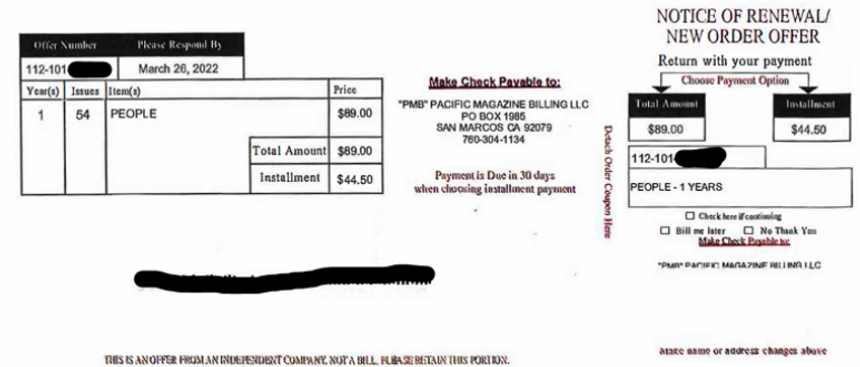- with readers working within the Chemicals industries
Earlier this summer, the California Attorney General, along with the District Attorneys from six California counties, entered into a settlement with Pacific Magazine Billing, resolving allegations that the company misled consumers by sending subscription solicitations that were disguised as bills. As part of the settlement, the company agreed to pay $275,000 and to be permanently banned from working in the mail order magazine business.
In announcing the settlement, California Attorney General Rob Bonta said, "Pacific Magazine Billing used dishonest tactics to trick recipients into thinking they owed money to get consumers to sign up for a magazine subscription. Today, the settlement secured by my office and our law enforcement partners sends a clear message to companies looking to make a buck off unsuspecting Californians: If you deceive consumers, we will go after you, it's that simple."
In the case, the AG and the DAs alleged that the company sent tens of millions of mailers that looked like bills for existing magazine subscriptions, when, in the truth, the mailers were just solicitations that were designed to deceive consumers into unknowingly starting or renewing subscriptions.
Under California law, it is illegal to solicit money using something that looks like an invoice unless it contains the following disclaimer: "THIS IS NOT A BILL. THIS IS A SOLICITATION. YOU ARE UNDER NO OBLIGATION TO PAY THE AMOUNT STATED ABOVE UNLESS YOU ACCEPT THIS OFFER." In addition, the disclaimer must (among other things) be displayed in conspicuous boldface capital letters, in a contrasting color, and in type as large, bold, and conspicuous as any other print in the solicitation (but no less than 30-point type), and it must not be obscured in other ways. Federal law has similar requirements, and the use of the language prescribed by the federal statute, complies with California law. (U.S. Postal Service rules apply as well.)
Here, the AG and the DAs alleged that the mailer misled consumers into believing that it was an actual invoice. They pointed to the fact that (among other things) it looked like an invoice, it mentioned specific publications, and used language that suggested that it was, in fact, an invoice (such as "Notice of Renewal"). They also alleged that the disclaimers used by the company didn't comply with California or federal law.
Certainly, if you're a direct mail company, this is an important case to be aware of – and these are important rules to comply with. But, the broader point that is relevant to all advertisers, is that this is yet another case where regulators are emphasizing a basic principle of advertising law – that consumers have the right to know when they are being advertised to.
If you deceive consumers, we will go after you, it's that simple.

The content of this article is intended to provide a general guide to the subject matter. Specialist advice should be sought about your specific circumstances.


